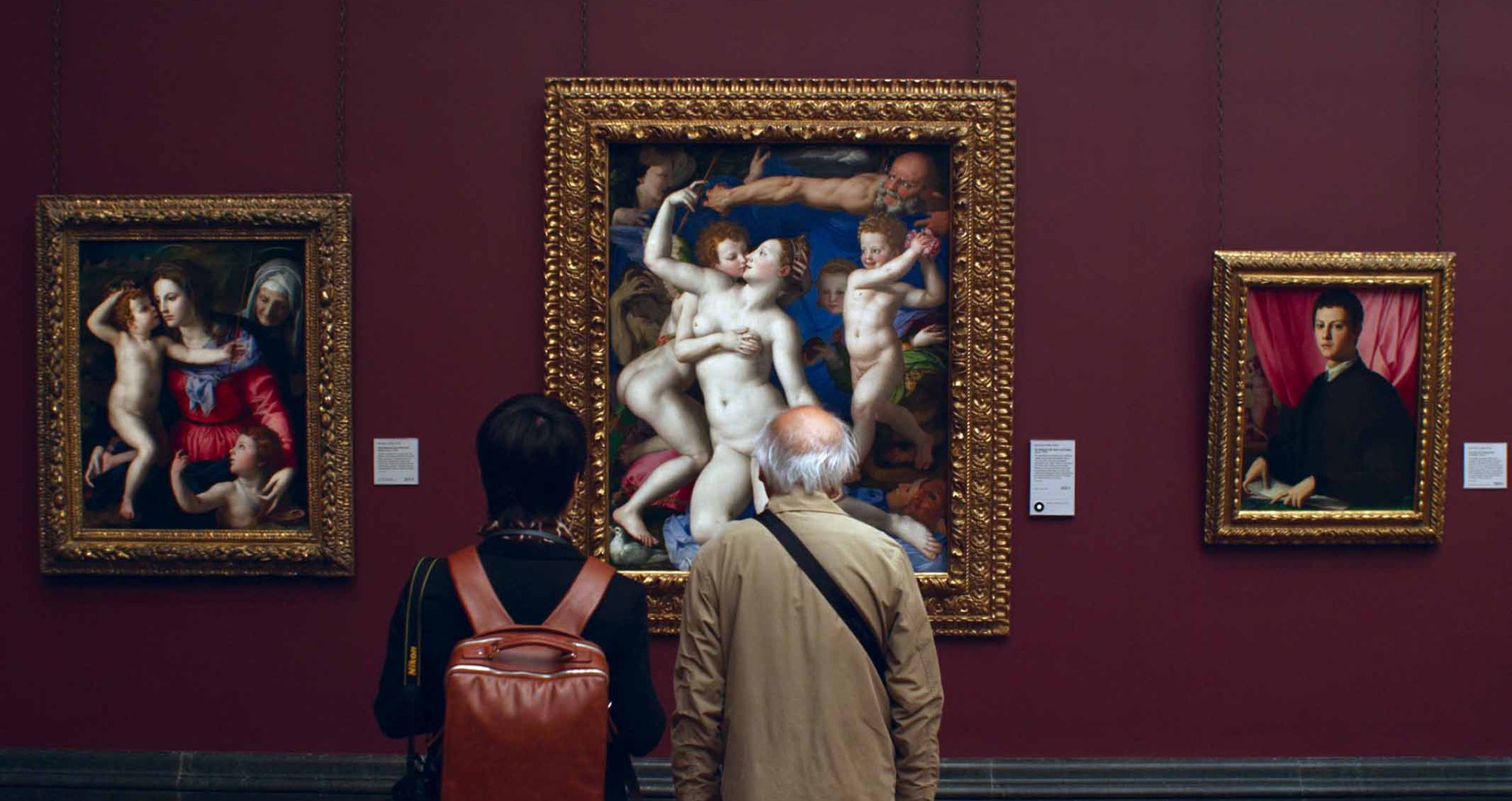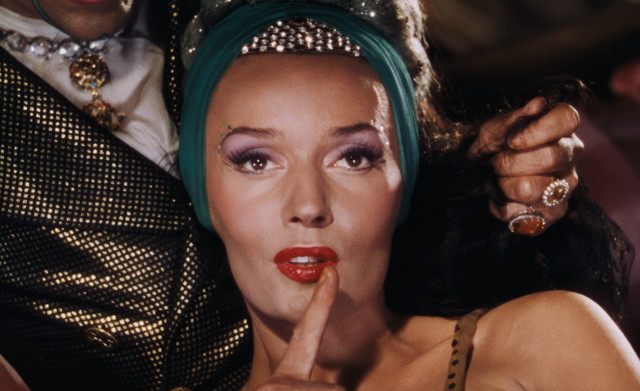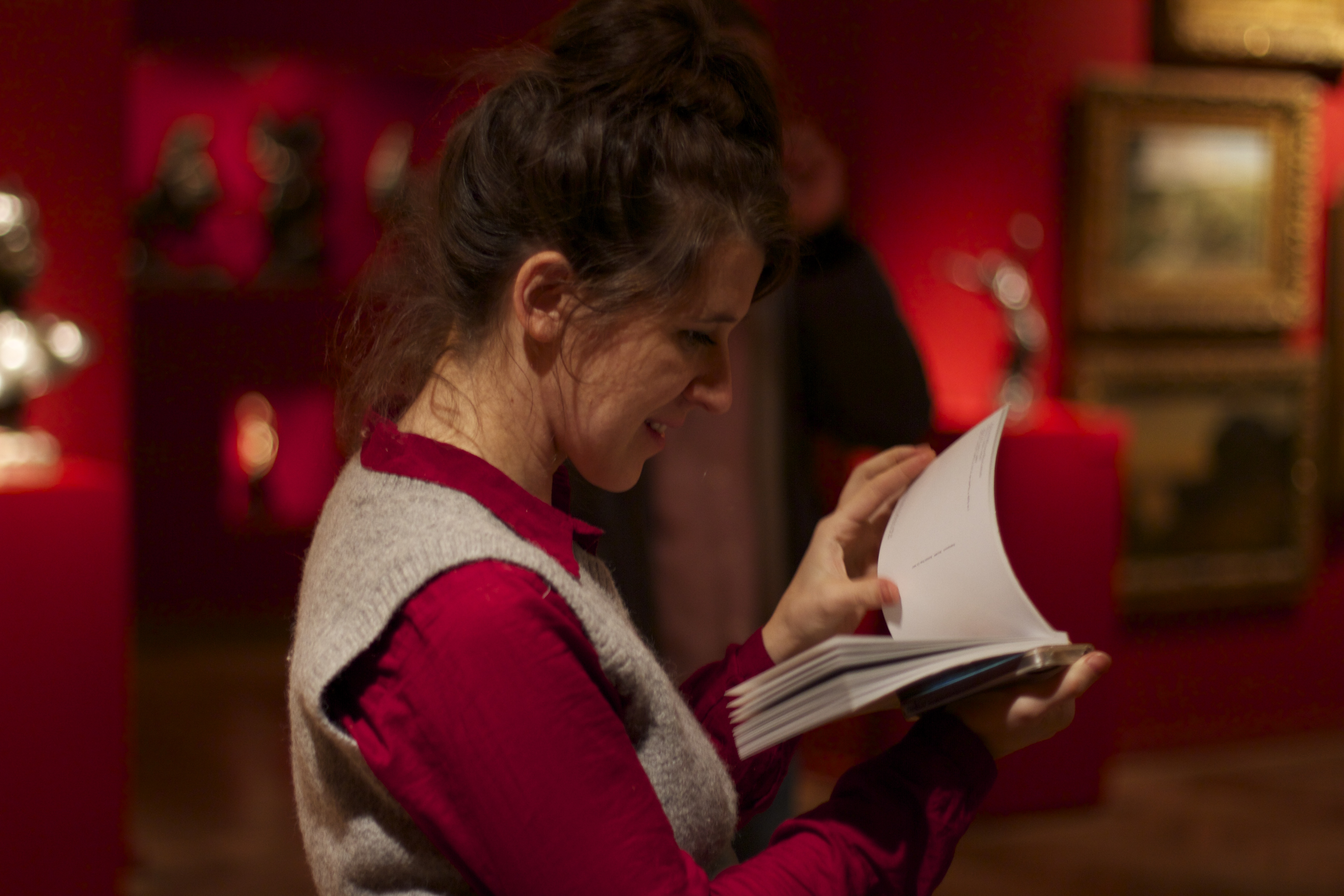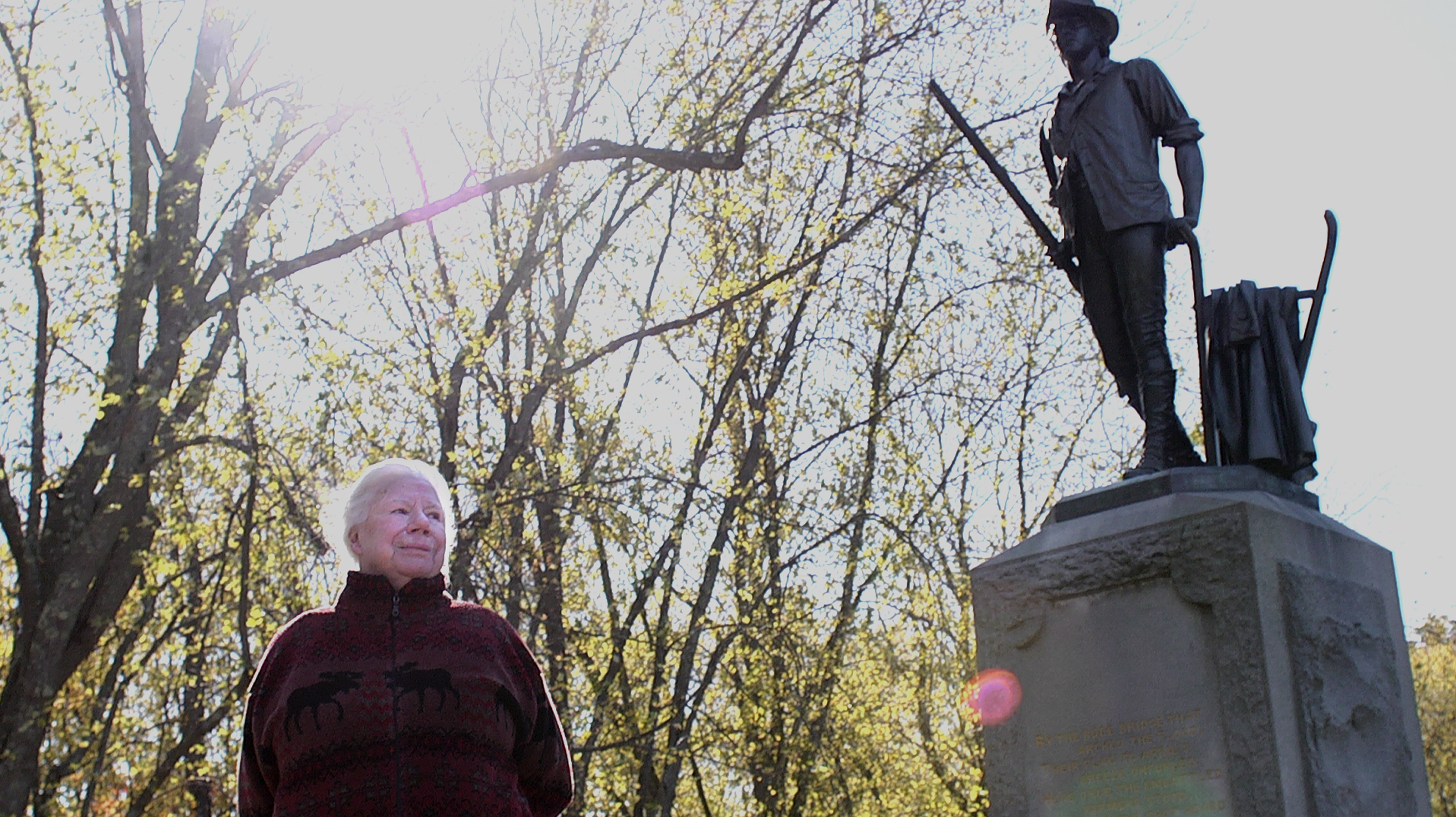National Gallery
Directed by Frederick Wiseman (U.S./France 2014) 181 min. DCP.
In his 39th documentary Wiseman takes us behind the scenes of one of the world’s foremost art institutions. In his expansive and probing style, the director constructs a portrait of a place that reveals its inner workings and its relations with the world, listening raptly as docents decode the great canvases of Da Vinci, Rembrandt, and Turner; visiting with the museum’s restorers as they use magnifying glasses, scalpels, and Q-tips to repair an infinitesimal chip; and attending administrative meetings in which senior executives politely battle with younger ones who want the museum to become less stodgy and more welcoming to a larger cross-section of the public. At the heart of the museum, and the film, are the masterpieces themselves, the great works of Western art from the Middle Ages to the 19th Century that inhabit the London National Gallery’s premier collection of paintings. Introduced by Bucknell Art History Professor Christiane Andersson. Co-sponsored by the Bucknell Department of Art and Art History.
“Among this movie’s many attractions is the extraordinary geometry of looks that Mr. Wiseman traces as he draws lines among the people in the paintings, the people looking at the paintings and, of course, you, the movie viewer.” – Manohla Dargis, New York Times
TOP OF PAGE
Tuesday, January 27 at 7pm
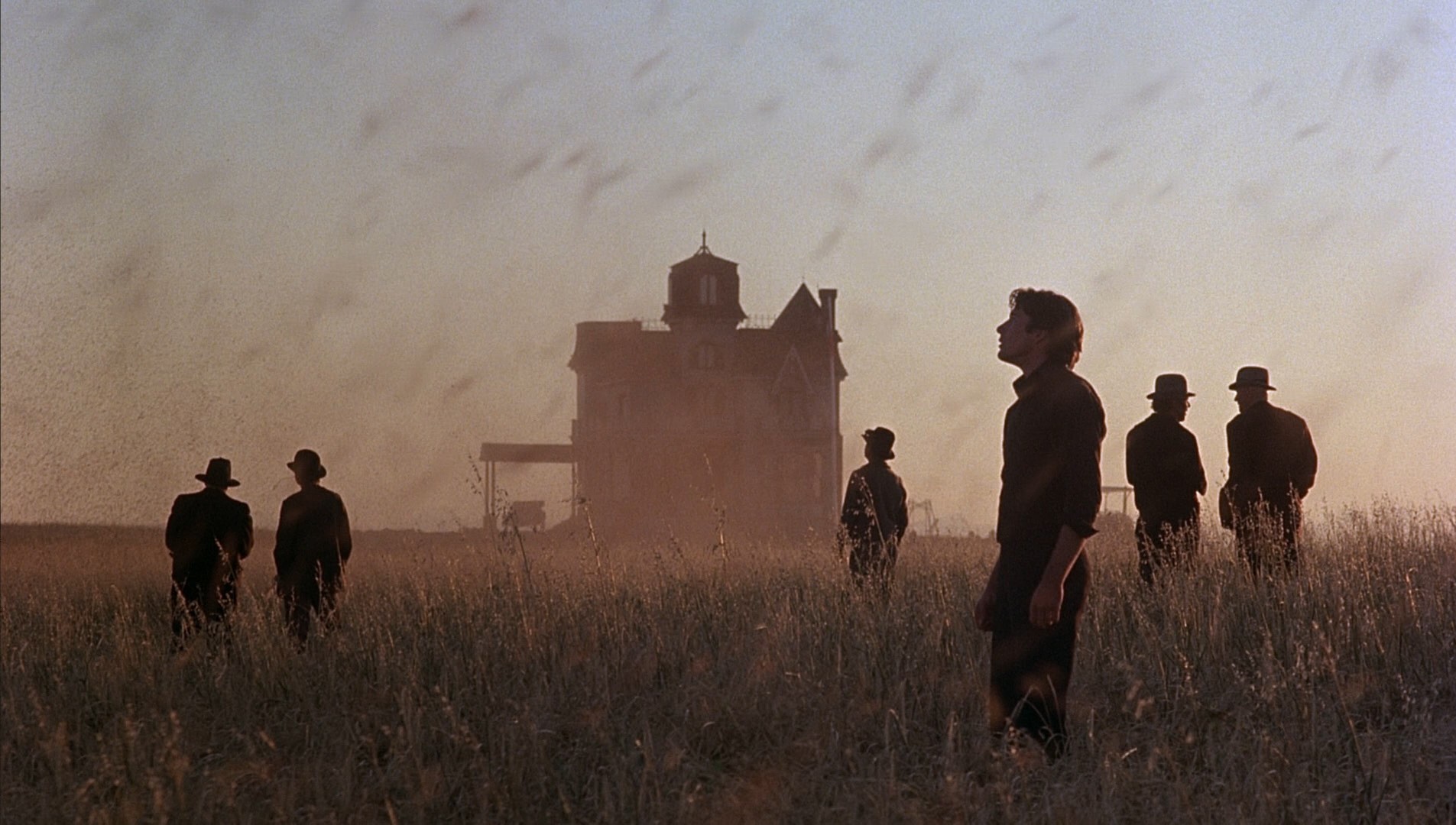
Days of Heaven
Directed by Terrence Malick (U.S. 1978) 95 min. 35MM. With Richard Gere, Brooke Adams, Sam Shepard.
Released five years after his debut feature Badlands, Malick’s second film is a decadently illustrated tragedy whose majestic cinematography (by Nestor Almendros) earned the film universal acclaim as a visual masterpiece. Among the fertile wheat fields of the Texas Panhandle in the early 20th century, a wealthy landowner (Shepard, in his first on-screen role) falls in love with the girlfriend (Adams) of a quick-tempered farmhand (Gere). Tensions give way to greed and deception, compromising the harmony of the natural environment that fuels the film’s atmosphere of grace and lyricism. Co-sponsored by the Bucknell Arts Council. Free admission for Arts Pre-Orientation 2014 students.
“Malick’s vision of history and geography is poetic rather than factual, so too his sense of narrative lyrical rather than linear. Nothing sets him apart from his contemporaries, not to mention the succeeding generation of American directors, as much as his commitment to cinematic beauty.” – Vlada Petric, Film Quarterly
TOP OF PAGE
Tuesday, February 3 at 7pm
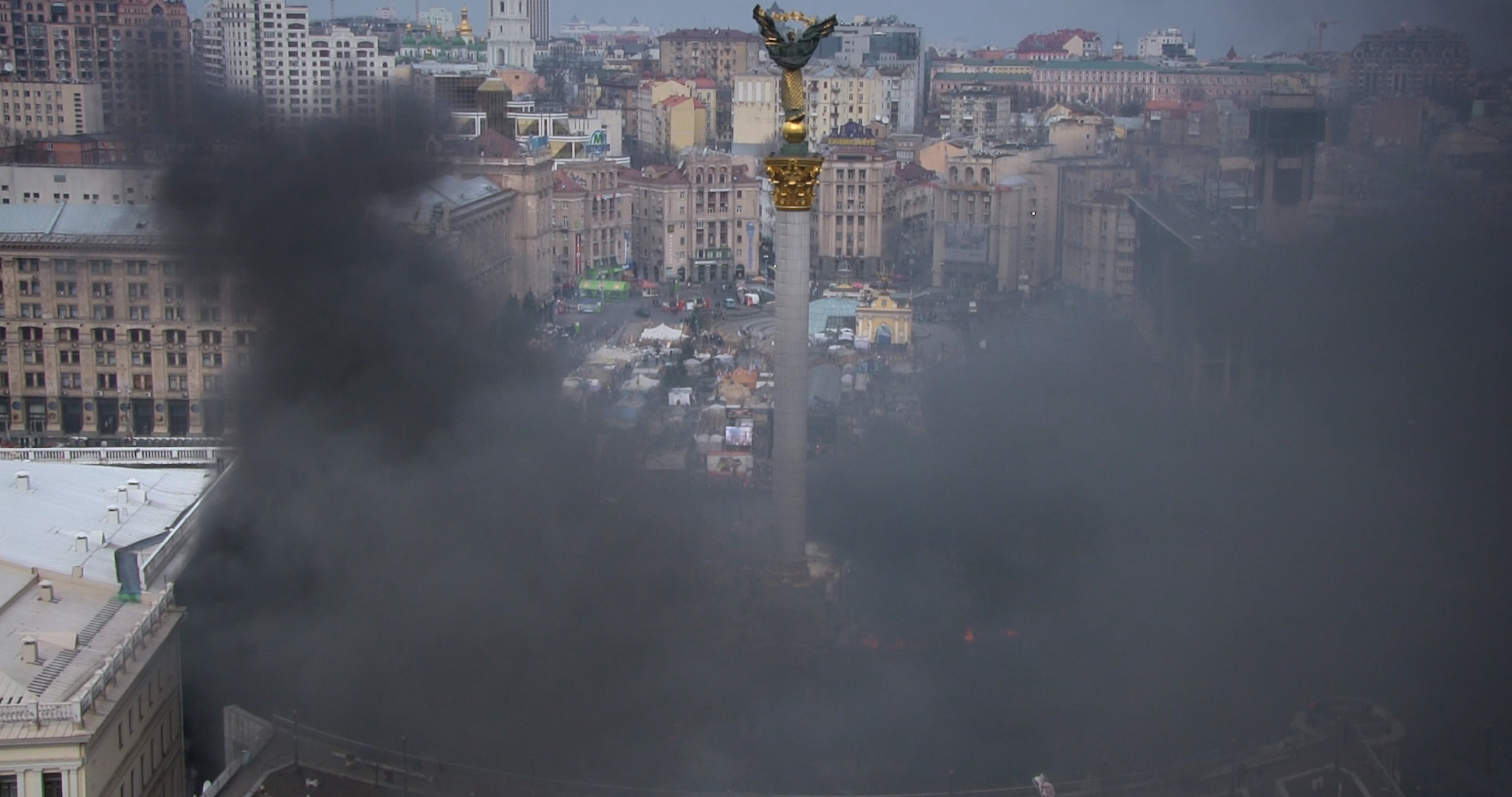
Maidan
Directed by Sergei Loznitsa (Ukraine/Netherlands 2014) 131 min. Ukrainian with English subtitles. DCP.
Acclaimed filmmaker Sergei Loznitsa chronicles 90 crucial days of the civil uprising that toppled the government of Ukrainian president Victor Yanukovich and has since developed into an international crisis between Russia and the West. Loznitsa and his cameraman were in Kiev’s Independence Square (Maidan) for the peaceful demonstrations in November 2013 – described by the director as a euphoric expression of “solidarity, camaraderie and an authentic spirit of freedom” – and for the bloody street battles that erupted following the government’s January 2014 ultimatum. Filmed in stunning long takes, without commentary, Maidan is a monumental record of a momentous historical event. Co-presented with Bucknell’s Russian Studies Program. Introduced by Slava Yastremski, Bucknell Professor of Russian. Screening will be preceded by a 6pm panel and reception with two Penn State University guests: Michael Naydan, Waskob Professor of Ukrainian Studies and Catherine Wanner, Barry Director of the Paterno Fellows Program.
“In a bold and controversial move, Loznitsa rises above political complexities to observe the nature of the civil uprising as a social, cultural, and philosophical phenomenon, chronicling the sheer mechanics and vigor of human movement and expression as they are activated by political action… (Cinephiles will note the formalist invocations of Eisenstein’s masterpieces Strike and October — a daring and surprising gesture for a film about a people’s struggle against Russian hegemony.) Epic in scale, breathtakingly cinematic, and critically urgent, Maidan is a major work of our time.” – Andréa Picard, Toronto International Film Festival
TOP OF PAGE
Tuesday, February 10 at 7pm
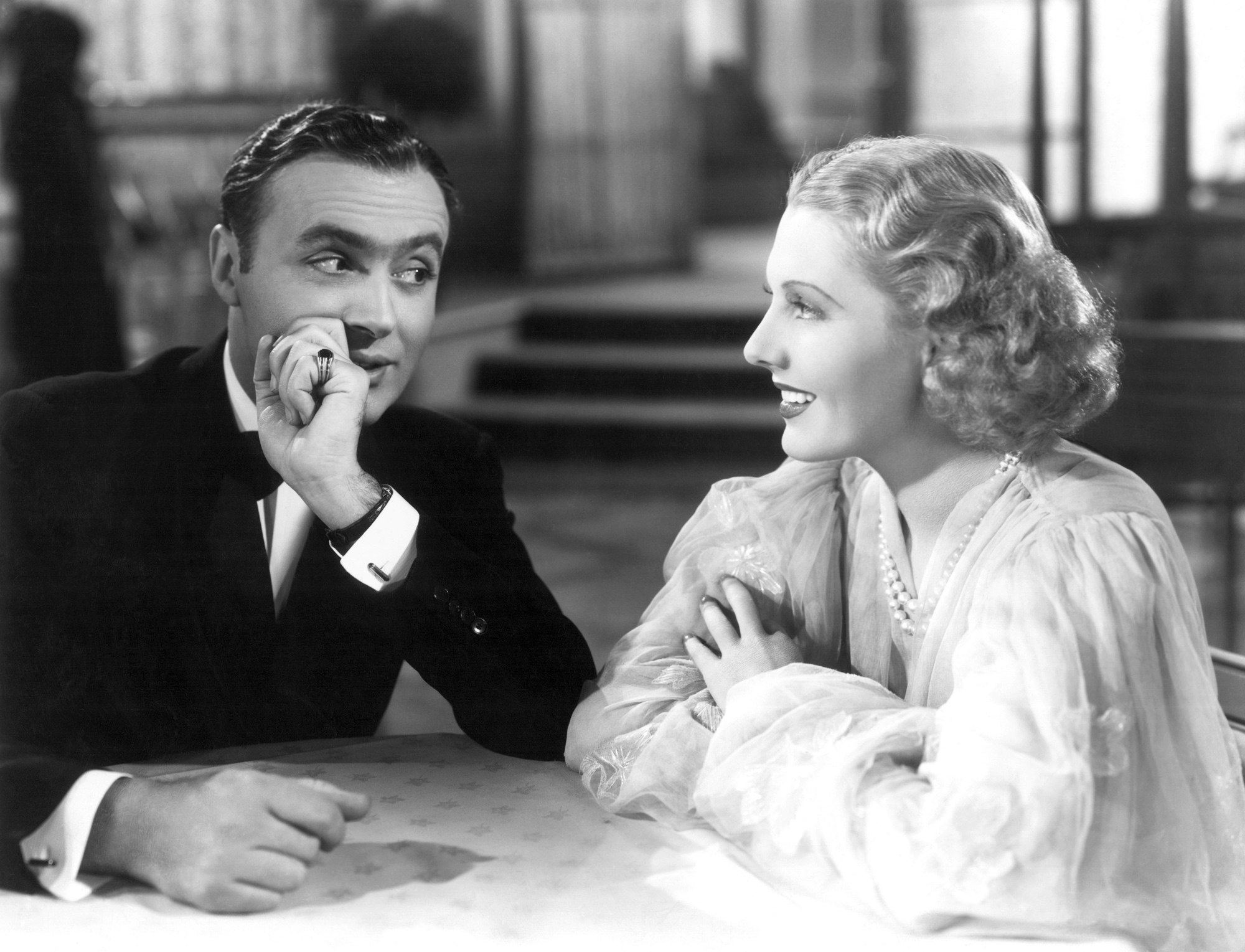
History is Made at Night
Directed by Frank Borzage (U.S. 1937) 97 min. 35MM. With Charles Boyer, Jean Arthur, Colin Clive, Leo Carrillo.
History is Made at Night is “not only the most romantic title in the history of the cinema but also a profound expression of its director’s commitment to love over probability” (Andrew Sarris). When the ever graceful Charles Boyer intervenes in a conniving husband’s attempt to pin adultery on his wife (played by the effervescent Jean Arthur) a real love triangle, one worthy of jealousy, develops. Borzage, perhaps cinema’s most supreme painter of impossible desire, veers deliriously from screwball comedy to melodrama, from suspense to disaster – plotting his way toward the film’s primary goal: bringing two lovers together. Bring your Valentine! 35mm preservation print courtesy of the UCLA Film & Television Archive.
Borzage’s films “stand not only as masterpieces of an old-fashioned cinema of sentiment, but as essays in mad love, aware that desire at its most intense touches upon perversity, and creates its own world beyond the laws made by men.” – Tom Gunning, Sight & Sound
TOP OF PAGE
Tuesday, February 17 at 7pm
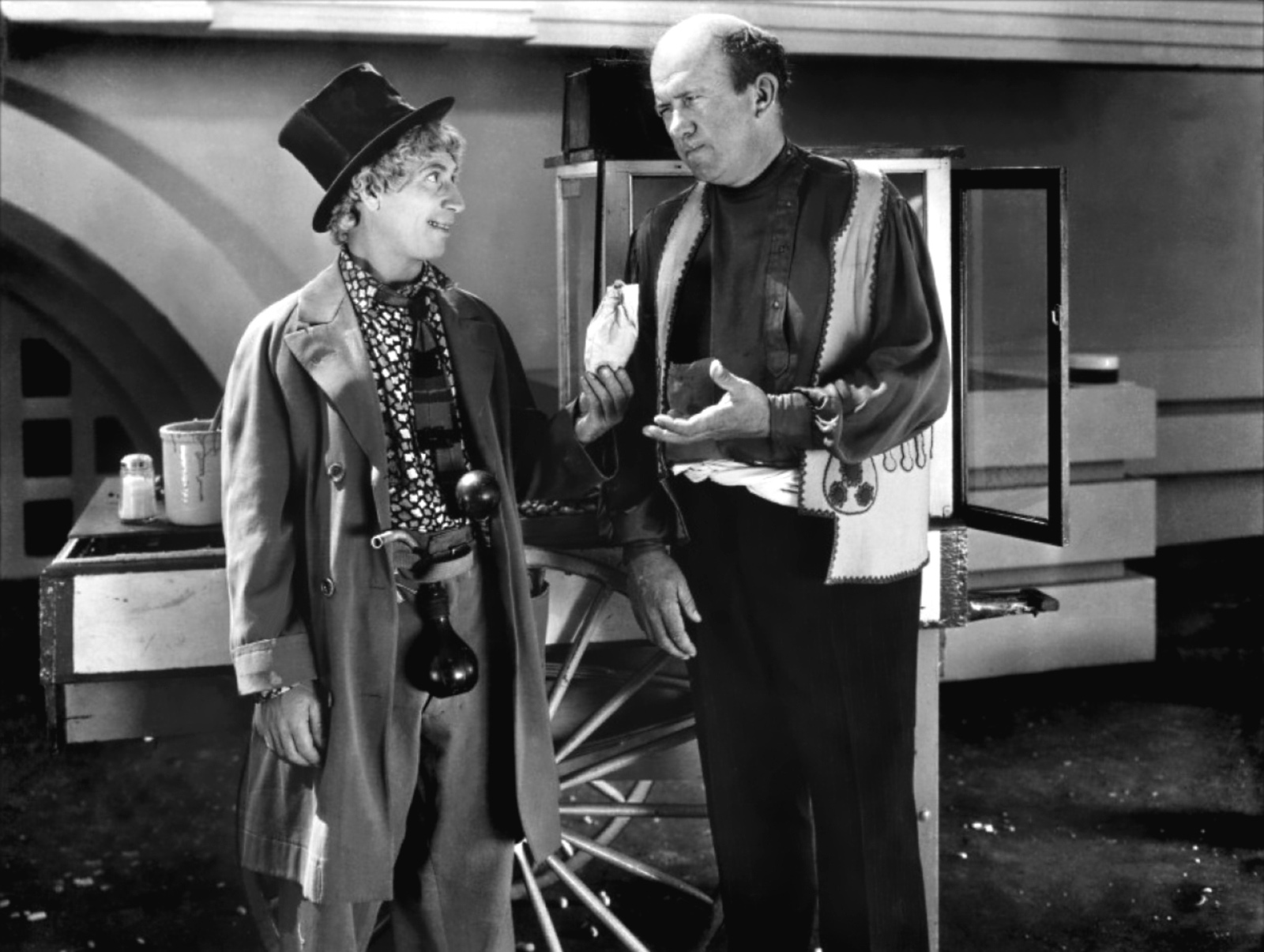
Duck Soup – Provost’s Pick!
Directed by Leo McCarey (U.S. 1933) 80 min. 35MM. With Groucho, Harpo, Chico, and Zeppo Marx, Margaret Dumont.
Invited to present a film in the Tuesday series, Bucknell Provost Mick Smyer chose the Marx Brothers’ seminal 1933 political satire Duck Soup. From the zaniest comedy team in film history comes this absurd anti-war story, in which Groucho is appointed Prime Minister of Freedonia, and promptly declares war on the neighboring Sylvania over the love of a rich widow. It’s complete comic anarchy, with brother Zeppo as the fearless leader’s sidekick and Harpo and Chico playing spies (one who never talks, the other a spy who talks too much). The immaculate timing and riotous hilarity of the Marx Brothers’ shtick calls for viewing with an audience – bring the whole family!
TOP OF PAGE
Tuesday, February 24 at 7pm
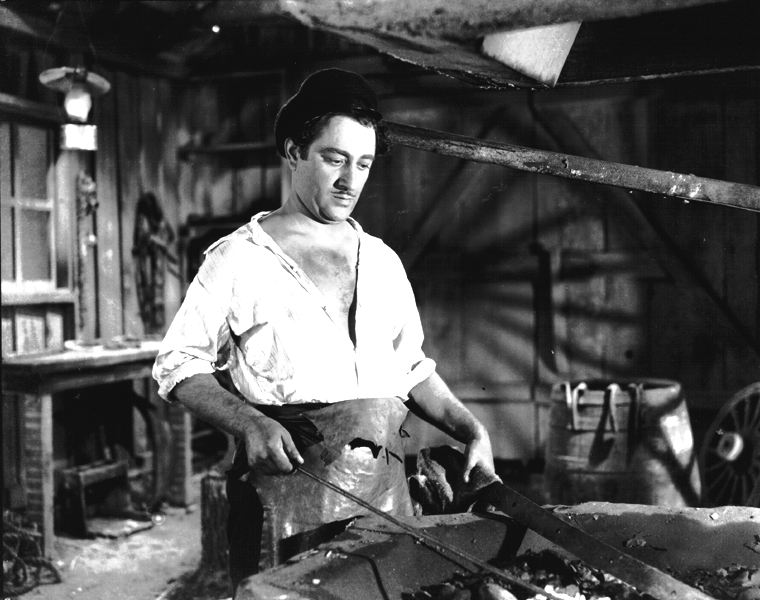
The Singing Blacksmith – Restoration Print!
Directed by Edgar G. Ulmer (U.S. 1938) 105 min. 35MM. With Moishe Oysher, Miriam Riselle, Florence Weiss. Yiddish with English subtitles.
Moishe Oysher, the renowned cantor and star of Yiddish radio, stars in Ulmer’s musical version of David Pinski’s play Yankl der Shmid (1906). Singing, dancing, and flashing his eyes, Oysher gives a robust performance as a passionate shtetl blacksmith who must struggle against temptation in order to become a mensch. Recently rediscovered footage makes this the most complete extant version of Ulmer’s lively folk operetta, replete with an example of Yiddish swing and a special opening poetry reading by Leo Melamed, a Yiddish child actor who would grow up to become the Chairman Emeritus of the CME Group (formerly the Chicago Mercantile Exchange). Film restoration by The National Center for Jewish Film, www.jewishfilm.org. Co-sponsored by Bucknell’s Department of Languages, Cultures & Linguistics. Introduced by Professor of Jewish Studies Rivka Ulmer.
The Singing Blacksmith comes “closer than Green Fields to the expressionistic noirs and thrillers Ulmer would make in Hollywood during the 1940s.” – J. Hoberman, Bridge of Light: Yiddish Film Between Two Worlds
Special Weis Center Offer for Film Patrons! Come see David Krakauer’s Jewish heritage multimedia performance “The Big Picture” Saturday, Feb. 28! 50% off tickets available online only. Use promo code YIDDISH at checkout. Limit 2 tickets per type.
TOP OF PAGE
Tuesday, March 3 at 7pm
Deep Time Shorts Program
Organized in conjunction with the Samek Museum’s exhibition of Rachel Sussman’s “The Oldest Living Things in the World.” Co-sponsored by the Samek Museum.

Spiral Jetty
Robert Smithson (U.S. 1970) 32 min. 16MM.
Smithson’s meditation on his renowned earth work, on the shore of Utah’s Great Salt Lake. “The movie editor… resembles a paleontologist sorting out glimpses of a world not yet together, a land that has yet to come to completion, a span of time unfinished, a spaceless limbo on some spiral reels… Everything about movies and moviemaking is archaic and crude. One is transported by this Archeozoic medium into the earliest known geological eras. The movieola becomes a ‘time machine’ that transforms trucks into dinosaurs” (Robert Smithson).
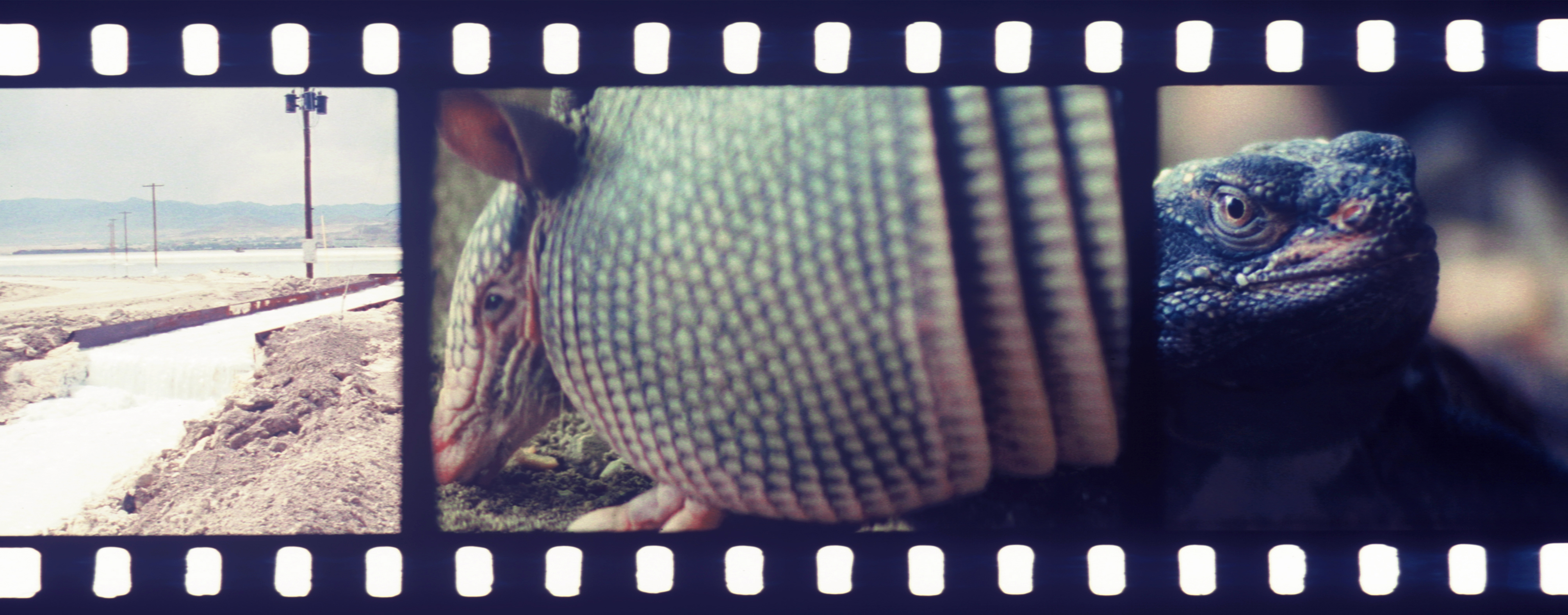
JG
British artist Tacita Dean, inspired by her correspondence with J.G. Ballard about connections between his short story “The Voices of Time” (1960) and Smithson’s iconic earthwork and film Spiral Jetty, traveled to Utah for the image track of JG. “While Smithson’s jetty spiralled downward in the artist’s imagination through layers of sedimentation and prehistory, in ancient repetition of a mythical whirlpool, coiling beneath the surface of the lake to the origins of time in the core of the earth below, the mandala in ‘The Voices of Time’ is its virtual mirror, kaleidoscoping upwards into cosmic integration and the tail end of time” (Tacita Dean).
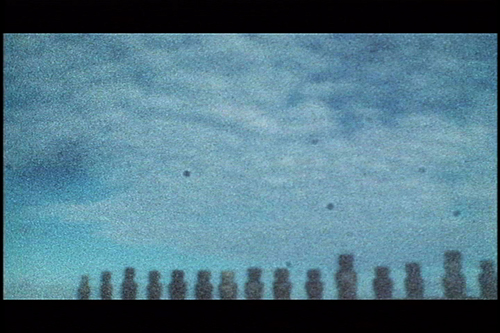
Terra Incognita
“A lensless film whose cloudy pinhole images create a memory of history. Ancient and modern explorer texts of Easter Island are garbled together by a computer narrator, resulting in a forever repeating narrative of discovery, colonialism, loss and departure” (Ben Russell).
TOP OF PAGE
Tuesday, March 10 at 7pm
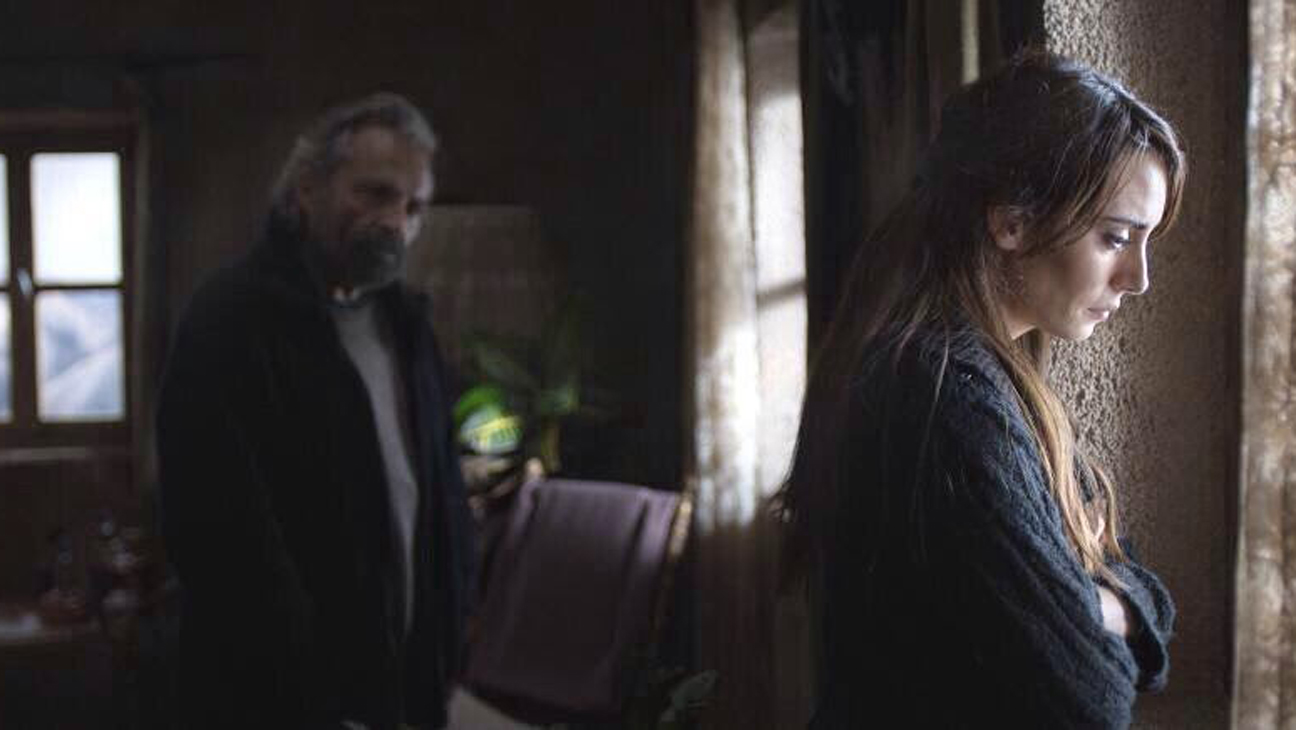
Winter Sleep
Directed by Nuri Bilge Ceylan (Turkey / France / Germany 2014) 196 min. DCP. With Haluk Bilginer, Melisa Sözen, Demet Akbag. Turkish with English subtitles.
Winner of the Palme d’Or at Cannes, the new film from Nuri Bilge Ceylan blends two Chekhov works into an immersive, meditative chamber drama of marriage and class set in the striking landscape of Central Anatolia. A former actor who runs a mountaintop hotel with his wife procrastinates on beginning a book about the history of Turkish theatre, instead writing a column for the local paper. His proclamations, potent with cultural pretension, reveal a smug self-satisfaction that is gradually undermined by the resentment of the villagers, his sister and a wife who no longer loves him.
“Ceylan’s bracingly humanist vision… [is a] treasure trove of exquisite widescreen images, taking particular advantage of the Cappadocian landscape as it’s being pelted with snow. And yet, for all the region’s visual wonders — eerie cave formations, buildings cut directly into rock, wild horses galloping freely about — the supreme visual achievement of Winter Sleep may well be the beauty it finds in the crags and contours of its actors’ marvelously expressive faces.” – Justin Chang, Variety
TOP OF PAGE
Tuesday, March 17 at 7pm
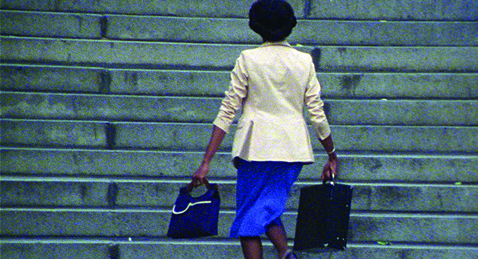
LOSING GROUND – Theatrical Premiere
Directed by Kathleen Collins (U.S. 1982) 86 min. DCP. With Seret Scott, Bill Gunn, Duane Jones.
Kathleen Collins’ passionate and imaginative romance finally received its first and long overdue release last month in the Film Society of Lincoln Center’s revelatory series “Tell It Like It Is: Black Independents in New York, 1968-1986.” One of the first African American women to direct (and write) a feature film, Collins was a civil-rights activist in the early sixties with a master’s degree in French literature and a career as a film professor at City College of New York until her untimely death at the age of 46. Sarah, Losing Ground’s protagonist, is a philosophy professor researching the philosophical and religious meaning of ecstatic experience; over the course of a summer break, the ground shifts when cultural and personal expectations related to race and gender clash with her marriage and professional aspirations. A Milestone Films release. Co-sponsored by Bucknell’s Philosophy Department and Women’s and Gender Studies Program.
“The movie is a nearly lost masterwork. Had it screened widely in its time, it would have marked film history… Collins films with a transformative simplicity, reminiscent of the style of Roberto Rossellini, unfolding daily activities with forthright beauty and didactic clarity.” – Richard Brody, The New Yorker
THE FORGOTTEN SPACE
Directed by Allan Sekula and and Noël Burch (U.S. 2012) 112 min.
The oceans through which 90% of the world’s cargo passes are the “forgotten space” of the film’s title, and at the heart of this space is the container box, which, since its invention in the 1950s, has become one of the most important mechanisms for the global spread of capitalism. Employing a wide range of materials and styles, this panoramic portrait follows the container box along the international supply chain, mapping the byzantine networks that connect producers to consumers and visiting the major ports of Rotterdam, Los Angeles, Hong Kong, Guangdong province and many places in between. Dr. Benjamin Hayes, Director of the BCSE’s Watershed Sciences and Engineering Program, will introduce the film. Co-sponsored by the Bucknell Center for Sustainability and the Environment.
“The Forgotten Space begins as an investigative documentary and concludes as a mythopoeic essay on modernity and the sea.” — Artforum
THE TALES OF HOFFMAN – Digital Restoration
Directed by Michael Powell, Emeric Pressburger (UK 1951) 138 min. DCP. With Moira Shearer, Robert Rounseville, Ludmilla Tchérina.
Powell and Pressburger’s lush take on French composer Jacques Offenbach’s 1881 opera is an exhilarating marriage of cinema and opera: music, dance, color, light, and rhythm. The directors brought together an expert team for the production, among them Sir Thomas Beecham, who conducted the Royal Philharmonic; Moira Shearer, Ludmilla Tchérina, Robert Helpmann, and Léonide Massine, dancing principal roles along with choreographer Frederick Ashton; and cinematographer Christopher Challis, who roamed the sets with a liberated camera, freed from the usual demands of sync sound shooting (the film was entirely post-synchronized). Restored by The Film Foundation and the BFI National Archive in association with Studiocanal. A Rialto Pictures release. Introduced by Emily Martin, Visiting Assistant Professor of Music and Director of Bucknell Opera Workshop. Co-sponsored by Bucknell’s Music Department. Singers in the Bucknell Opera Workshop will perform songs from the opera downtown before the screening. More details will be announced on our website soon!
“As intensely expressionistic as any film since Caligari, and at the same time a veritable nova of springtime élan, the movie inhabits a unique puppet-theater universe, and could seduce a eunuch. There’s just no describing this thing…” – Michael Atkinson, The Village Voice
THE PRINCESS OF FRANCE- Director in Person!
Directed by Matías Piñeiro (Argentina 2014) 70 min. DCP. With Julián Larquier, Agustina Muñoz, María Villar. Spanish with English subtitles.
The latest of Piñeiro’s revisionist takes on Shakespeare imagines life imitating art when a Buenos Aires theatre company mounts a radio version of Love’s Labour’s Lost. The filmmaker’s familiar troupe of actors (last seen at the Campus Theatre in his international hit Viola) inhabit the roles of a young man returning from Mexico to rekindle his artistic pursuits and the five women with whom his past, present and future romantic entanglements intermingle. The lyricism of their flirtatious soliloquies fuses with the film’s fluid cinematography, the languages of theatre, literature and cinema melding into a spirited and knowing vision of love, desire, art, music and performance. Co-sponsored by the Bucknell Innovation Group (BIG).
“Ever ready to take flight, [Piñeiro’s films] remain tethered to earth by the faces, bodies, and voices of the director’s wonderful stock company of Every(wo)man players; they’re playful without being frivolous, virtuosic without being showy, erotic without explicitness, transgressive without shock. … As The Princess of France attests, Piñeiro is one of the most exciting and accomplished filmmakers working today.” – Andrew Tracy, Cinema Scope
PLEASE NOTE TIME CHANGE – 7:30PM
Tuesday, April 14 at 7:30pm
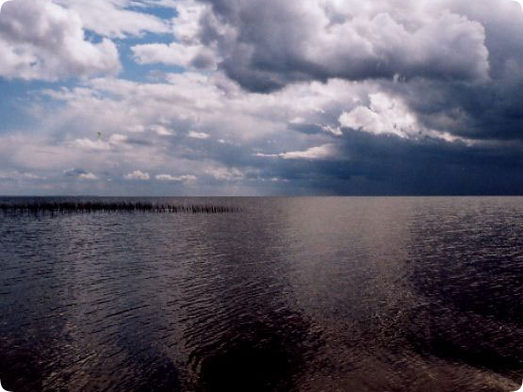
THIRTEEN LAKES – Film Historian Scott MacDonald in Person!
Directed by James Benning (U.S. 2005) 135 min. 16MM.
For four decades, James Benning has played a central role in the history of American independent cinema by offering rigorously structured, conceptually minimalist and gracefully wondrous meditations on the American landscape and its social and environmental histories. 13 Lakes presents as many bodies of water from across the United States – each chosen for its unique historical, ecological and geographical characteristics and offered to the viewer in static, 10-minute long shots. As an experience, the film is a seductive invitation to enter a richly nuanced and intimate contemplation of the mystery of the natural world. 13 Lakes was added to the National Registry in 2014. Co-sponsored by Bucknell’s Office of the Provost; Programs in Environmental Studies and Place Studies; and the Center for Sustainability and the Environment.
“By the time the end credits identifying the lakes begin to roll, Benning has transformed his audience by modeling and demanding a more perceptually active sensual awareness of the world. This awareness argues that our culture’s tendency toward relentless distraction and hysterical consumption (and the latter’s planet-despoiling implications) need not be the inevitable product of modern life, and reminds us, as Thoreau reminded us in Walden, that slowing down and appreciating the moment-by-moment incarnation of the physical world can transform our sense of what we are and what we– as individuals and as a culture – need.” – Scott MacDonald, Artforum
DIVIDE IN CONCORD
Directed by Kris Kaczor (U.S. 2014) 82 min. DCP.
This tale of a “bottled water ban battle” follows the widely publicized efforts of Jean Hill, a local eighty-four year-old activist trying to stop the sale of single-serve plastic bottles in Concord, Massachusetts, site of the 1775 “shot heard round the world” that began a Revolution, and of Henry David Thoreau, father of environmentalism. In the 21st century, many Concord residents recycle, but chafe at the idea of being disallowed the freedom to decide what to buy. Chronicling Hill’s untiring crusade against her neighbors’ resistance to the ban – not to mention strong opposition from local merchants and the bottled water industry – Kaczor depicts the daily grind, the passion and the legislative hurdles of grassroots activism. Co-sponsored by Bucknell’s Center for Sustainability and the Environment.
TOP OF PAGE
Tuesday, April 28 at 7pm – FREE FOR BUCKNELL STUDENTS
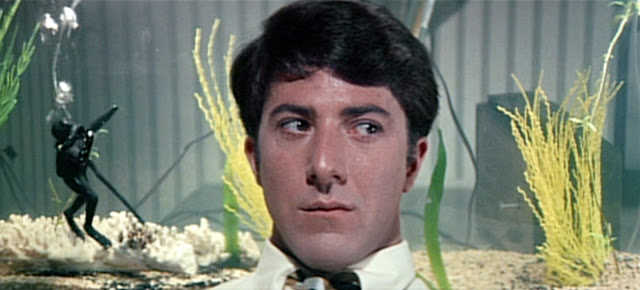
THE GRADUATE
Directed by Mike Nichols (U.S. 1967) 105 min. DCP. With Dustin Hoffman, Anne Bancroft, Katherine Ross.
Benjamin Braddock (Hoffman) graduates from college, moves back home and searches for direction, bouncing between an affair with the wife of his father’s partner (“Mrs. Robinson, you’re trying to seduce me…aren’t you?”) and her daughter, the woman of his dreams. The Graduate’s tale of restlessness and ennui, and its legendary Simon & Garfunkel soundtrack, was a generational milestone, and it remains a classic of the American screen – recommended viewing before commencement, Class of 2015!
“The funniest American comedy of the year… Hoffman is so painfully awkward and ethical that we are forced to admit we would act pretty much as he does, even in his most extreme moments. Bancroft, in a tricky role, is magnificently sexy, shrewish, and self-possessed enough to make the seduction convincing… Benjamin’s acute honesty and embarrassment are so accurately drawn that we hardly know whether to laugh or to look inside ourselves.” – Roger Ebert
